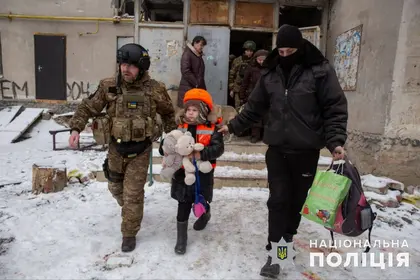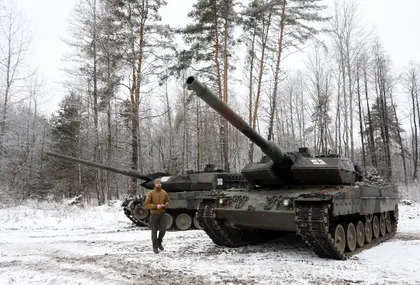"I saw six children of ages 2 to 14 years myself in Katerynivka (Donetsk region). They walk on during shelling as if nothing is happening,” says UK volunteer Michael Holly. “In the front zones, there are no schools and no medicine. People are hungry and sick. They cook food on open fires. I think these children should be forcibly evacuated. If parents fail to protect children's rights and provide safety, the state should step up."
JOIN US ON TELEGRAM
Follow our coverage of the war on the @Kyivpost_official.
On April 9, Holly, who supplies medical help to locals in the combat zones had just arrived in Kyiv from the Donetsk region and told the Kyiv Post that one of the most shocking things for him was to see children living in active war zones.
Kyiv Post got exclusive comments from Verkhovna Rada lawmaker Mariana Bezuhla, who initiated legislation to require the evacuation of children from such war-torn areas.
“The children are not safe in the frontline zones, and the state should act to protect children's lives,” Bezuhla says. “At the moment, the proactive stance of the local authorities is enough to start the process. I have seen and experienced how it works in Avdiivka, where only 24 children had to be evacuated in early March.”
Since March 7, The Cabinet of Ministers of Ukraine has allowed the forced evacuation of children from the areas of active hostilities. Under their decree, children can be taken out of the combat zones accompanied by one of their parents, a person in loco parentis, or another legal representative. Conceptually, the parents are not be able to refuse the legally mandated evacuation of their children.

Russian Air Attack Kills Nine in Sumy Region
However, only Bakhmut meets the relevant criteria for the forced evacuation of children from the combat zone. Effectively, the existing Cabinet resolution remains non-compulsory for parents, but does give local authorities some power to mandatorily evacuate their children. For those reasons, lawmakers believe there is a need for reform.
Dmytro Lubinets, the Verkhovna Rada Commissioner for Human Rights commented:
“Sometimes I don't understand what arguments they [parents - ed.] use when they don't want to leave the settlements under direct shelling by the Russian Federation,” Lubinets said. “There have been repeated attempts to resolve this issue. But due to imperfect legislation, we cannot come and simply evacuate children.”
According to him, the adults responsible for the child need to be persuaded, in particular, to provide confirmation of funding, properly equipped accommodations, and provisional evacuation avenues.
“In order to directly take such actions [to come and take children, guided by the government's resolution - ed.] on forced evacuation, I think it is necessary to amend the law. The Cabinet of Ministers' resolution regulates some issues: the powers of the authorities are enunciated in the rules. But this is only a bylaw,” the Commissioner stressed.
Lawmaker Mariana Bezuhla is working to give authorities direct power through legislation in her bill on mandatory evacuation of children from areas of hostilities.
She reported to Kyiv Post that a draft of the law will be published soon for the public to examine:
“I am currently working on this bill and going to publish it for public discussion in April,” Bezuhla said.
However, regional authorities of the Donetsk region facing the problem have already started to take a more active role in children’s evacuation. On March 31, deputy head of the Donetsk regional military administration Yulia Kostyunina reported that mandatory evacuation of children would be introduced in 13 more districts in the region. Currently, it only applies to Bakhmut .
According to Kostyunina, as of March 30, more than 500 children and their parents have already been voluntarily evacuated from these communities. There are no families with children left in three districts out of 13 in the Donetsk region.
According to Pavel Kirilenko, head of the Donetsk regional military administration, less than 3,500 people remained in Bakhmut in mid-March.
There were also 32 children in the city whose relatives refused to evacuate.
You can also highlight the text and press Ctrl + Enter










